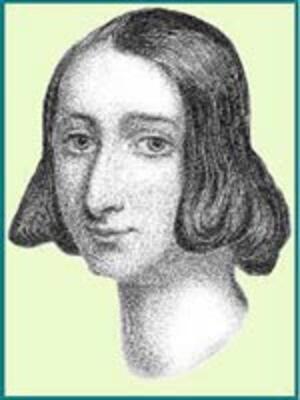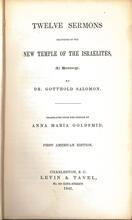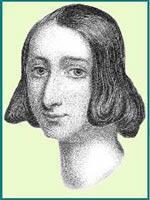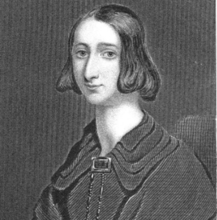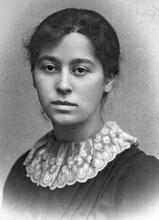Grace Aguilar
Born in England in 1816, Aguilar wrote an historical play at twelve and started writing her first novel at fifteen. Suffering from illnesses herself and tending to sick parents, Aguilar turned her writing from a hobby to a profession, publishing poetry, sermons, and The Spirit of Judaism, a discussion of Jewish practice. Aguilar then branched into fiction—historical romances, novels about contemporary women, and The Women of Israel, which explored the lives of Jewish women. In failing health, Aguilar wrote a radical essay on “The History of the Jews in England,” which argued against the pressures of assimilation and called Christians to account for the treatment of Jews in British society. Her death at 31 was mourned as “a national calamity” on both sides of the Atlantic.
When she died in 1847 at the age of thirty-one, Grace Aguilar enjoyed a reputation as a poet, historical romance writer, domestic novelist, Jewish emancipator, religious reformer, educator, social historian, theologian, and liturgist. A Jewish woman in Victorian England, Aguilar produced a body of work that appealed to both Jews and Christians, women and men, religious traditionalists and reformers. Distributed throughout the British Empire, Europe, and the United States, her books—which record the ambivalent encounter of a British minority with the majority culture—were translated into French, German, and Hebrew. She developed new and hybrid literary genres, helped to build the Anglo-Jewish subculture, advocated Jews’ emancipation in the Victorian world, and insisted on women’s emancipation in the Jewish world.
Early Life and Family
Grace Aguilar was born June 2, 1816, to Emanuel (1787–1845) and Sarah (1787–1854) Aguilar. Portuguese Jews who had fled to England to escape the Inquisition, her parents settled in the northeast London suburb of Hackney, where Aguilar was born. Emanuel served as the Parnas, or lay leader, of London’s Spanish and Portuguese Synagogue, and the family were active participants in the Sephardic community. Aguilar’s two brothers were Emanuel (1824–1904) and Henry (1827–1902). As a child, Aguilar contracted an undiagnosed illness that permanently weakened her and left her vulnerable to the other ailments from which she suffered throughout her life. The most serious of these included the measles (at age nineteen in 1835) and her final illness, a spinal ailment that paralyzed her muscles and lungs. These illnesses did not prevent her from keeping a multi-volume journal beginning at age seven, from dancing, from local travel, or from playing the piano and the harp, like other girls of the English middle class.
When Aguilar was twelve, her father contracted tuberculosis and the family moved to the coast in Devon for his health. There she wrote her first completed manuscript, a play called “Gustavus Vasa” about a Swedish king (now lost). For years her mother had provided her with a religious education; now, her father used his enforced rest to educate his daughter in Jewish history. He related the “oral history” of the crypto-Jews, those Descendants of the Jews who lived in Spain and Portugal before the explusion of 1492; primarily Jews of N. Africa, Italy, the Middle East and the Balkans.Sephardim who, to escape the Inquisition, had pretended to convert to Catholicism but continued to practice Judaism in secret. When she later drew on these tales to create her historical romances, her father served as her secretary.
Lacking any Jewish translation of the Bible into English, Aguilar often felt she could satisfy her religious yearnings only by going to hear sermons in Protestant churches. These church visits provided the material for one of her most moving and ironic poems, a reverie of Israel redeemed, entitled “A Vision of Jerusalem, While Listening to a Beautiful Organ in One of the Gentile Shrines.” Her practice of attending church would later provide fodder for her critics. Missionaries claimed to be able to see the light of the gospel in her work; Jewish critics claimed she was a “Jewish Protestant.”
Early Writings
By age fifteen Aguilar had started writing a historical romance set during the Spanish Inquisition, The Vale of Cedars; or, the Martyr. Written in reaction against Walter Scott’s (1771–1832) Ivanhoe, this romance took her four years to complete and was published only posthumously in 1850. During the period of composition, her mother Sarah underwent an operation and required her daughter’s bedside care for several years. With both parents ill, the family began to suffer economically, and Aguilar began to think seriously of trying to make a professional career as a writer. Beginning in 1834, she tried her hand at short domestic sketches and poetry in the manner of the poets Lord Byron (1788–1824), Walter Scott, and Felicia Hemans (1793–1835).
In 1835, her brothers were sent away to school and the family moved to Brighton. Here, Aguilar found a publisher for her first book of poems, The Magic Wreath of Hidden Flowers. These slight poems resemble the riddles collected by Emma Woodhouse in Jane Austen’s Emma: each poem contains clues to the name of a particular flower.
Despite her serious bout with the measles, Aguilar now began a ceaseless stream of literary production. In 1836–1837 she drafted the manuscript of her domestic novel Home Influence: A Tale for Mothers and Daughters. In this novel, its sequel A Mother’s Recompense, and the novel Woman’s Friendship, she offered her ideal model of the domestic woman who cared for husband and home and inculcated religion and morality into the hearts of her children. In the late 1830s she also wrote the liturgy, meditations, and sermons that later appeared in Sabbath Thoughts and Sacred Communings (1853).
In 1838, at her father’s request, Aguilar translated Orobio de Castro’s (1620–1687) apologia, Israel Defended, from the French and had it printed for private circulation in Brighton. Here, she was already striking the ambivalent tone—simultaneously trusting and suspicious of England, assimilationist and resistant—that would become the hallmark of many of her more mature works.
Transatlantic Renown
By 1840, Aguilar and her family had moved back to London, and she was writing letters from her new house at 5 Triangle, Hackney, from which she began to launch herself into the British and American literary worlds. She asked the young Benjamin Disraeli (1804–1881), a fellow member of the Sephardic community, to carry a letter to his father, Isaac, in which she requested that the elder D’Israeli help her find a publisher. He eventually secured her an introduction to an editor at R. Groombridge and Sons, the firm that produced most of her work for the English market.
From 5 Triangle, she also contacted Isaac Leeser (1806–1868), the editor of the American Jewish periodical, The Occident, who agreed to publish The Spirit of Judaism, Aguilar’s first major work, as the initial offering of his new series, The Jewish Publication Society of America. Unfortunately, the manuscript was lost at sea; but Aguilar rewrote it from her notes, and Leeser published it in 1842. When her copy arrived, Aguilar was angry to find that Leeser had attached an editorial preface and footnotes to her text in which he set forth “the chief points of difference between Miss Aguilar and myself.” A traditionalist himself, Leeser disliked Aguilar’s tendencies toward religious reform. Despite his critical notes, Spirit was well received by many Jews and Christians on both sides of the Atlantic and was used as a teaching text in some synagogues and even Protestant churches until the 1950s.
In Spirit of Judaism, Aguilar meditated on the significance of the Shema. She polemicized on behalf of both English tolerance and Jewish religious reform. She called for a vernacular translation of the Bible and changes in Jewish childhood education. And she offered a new vision of the spiritual needs of women in general and Jewish women in particular.
The book brought Aguilar into a steady association with Leeser. Beginning in 1843 and continuing throughout the remainder of her life, he published over thirty of her poems in The Occident, including “Vision of Jerusalem” and “The Wanderers,” the latter a A type of non-halakhic literary activitiy of the Rabbis for interpreting non-legal material according to special principles of interpretation (hermeneutical rules).Midrash on Hagar and Ishmael generally recognized as her most successful poem. It was not long before she was listed as the highest paid writer among the magazine’s contributors. This steady publishing relationship also enabled her to develop her own poetic style, a fascinating compound of romantic nature poetry, sentimentality, midrash, and prophecy.
Her association with Leeser brought Aguilar a transatlantic friendship with Miriam and Solomon Cohen of Savannah, Georgia. Miriam Cohen was the niece of Rebecca Gratz, Leeser’s associate and the founder of the Jewish Sunday School movement. When Cohen wrote to Aguilar in praise of Spirit of Judaism in 1842, the two women began an important correspondence that continued until Aguilar’s death, after which Sarah Aguilar continued to correspond with Cohen for many years, until 1853. Miriam Cohen’s husband, Solomon, became Aguilar’s chief American distributor, and apparently did a thorough job of it. His work enabled her to influence American Jewish women, such as Rebecca Gratz, who not only used Aguilar’s texts as teaching materials in her Sunday School but cited Aguilar as an inspiration in her determination to refuse marriage in order to continue with her work.
Aguilar also sought entrée into the British literary world through periodical publishing. In 1841, her poems began to appear in Anglo-Jewish periodicals such as the Voice of Jacob and the Jewish Chronicle. From the first, however, she sought an audience outside the Jewish community, publishing short tales in such popular women’s journals as The Keepsake, Friendship’s Offering, and La Belle Assemblée. Through such work Aguilar came to be acquainted with many writers of Romantic and early Victorian poetry, domestic fiction, and historical romance. Of these, Anna Maria Hall (1800–1881) became her greatest admirer. When Aguilar died, Hall wrote a long essay in memoriam entitled “Pilgrimage to the Grave of Grace Aguilar.” The essay was often reprinted by Jewish periodicals as well as in Hall’s book Pilgrimage to English Shrines (1853), which clearly placed Aguilar in the firmament of English writers.
Literary Success and Critical Acclaim
As a fiction writer, Aguilar produced historical romances through the mid-1840s, culminating with the tales in Records of Israel (1844). Increasingly, however, she found that these romances distanced English readers too much from contemporary Jews. She found the opportunity to describe contemporary Anglo-Jewish life when Charlotte Montefiore (1818–1859), an aristocratic English Jew, invited her to write a tale for a new series, the Cheap Jewish Library. Aguilar’s contribution, The Perez Family, is a sentimental domestic novella that documents Victorian Jews’ ambivalence toward their own modernization and demonstrates Aguilar’s belief in women’s capacity to interpret the dictates of the Bible.
Aguilar spent the last three years of her life writing intensively. In 1844, she produced The Women of Israel, the series of biographical accounts of biblical, Talmudic, and modern Jewish women that critics immediately recognized as her masterpiece. This text packed many of her passions into the space of three volumes. She was able to center Jewish history and midrash on women’s experience, articulate her own versions of domestic ideology and theology, and appeal for Jews’ emancipation and Christian social acceptance. She argued that women should have full educational access to Jewish religious materials, including the Lit. "teaching," "study," or "learning." A compilation of the commentary and discussions of the amora'im on the Mishnah. When not specified, "Talmud" refers to the Babylonian Talmud.Talmud.
Perhaps the success of Women was what enabled her in 1845 to relocate with her family to One Clarence Place, Clapton Square, where she tended to her dying father. At the same time, her own illness became increasingly severe. Still, she continued to produce at a remarkable pace. She wrote The Jewish Faith, a series of letters on immortality from an old woman to a young woman, published in 1846. In the same year, Anna Maria Hall introduced her to Robert Chambers (1802–1871), the radical Edinburgh publisher of Chambers’s Miscellany, who solicited an essay from her entitled “The History of the Jews in England.” This remarkable essay, published months before her death, offered a more radical vision of Jewish-Christian relations than Aguilar had dared to put forward in any previous text. Here Aguilar substantially rejected assimilationism and called English Christians to more stringent account than she had ever done before.
Death and Literary Legacy
By the spring of 1847 Aguilar’s final illness had taken hold. Perhaps it was their knowledge of its severity that prompted a group of middle-class Anglo-Jewish women calling themselves the “Women of Israel” to present Aguilar with a public testimonial on June 14. Immediately afterward, she traveled to Frankfurt, where her brother Emanuel was studying music, to try to recover her health. For six weeks she took the waters at Schwalbach, but she worsened and returned to Frankfurt, where she died on September 16. She was buried in the Frankfurt Jewish Cemetery, the epitaph on her tombstone taken from Proverbs 31 on the “woman of valor”: “Give her of the fruit of her hands; and let her own works praise her from the gates.”
Aguilar’s death was called “a national calamity” on the front pages of Jewish newspapers in England and the United States, and she was hailed as “the moral governess of the Hebrew family.” Mainstream and evangelical periodicals mourned her. Jews from as far afield as France, Jamaica, and Germany wrote tributes and poems in commemoration of her.
Aguilar’s novel, Home Influence, which was in press when she died, became her most popular work, selling out some thirty editions. Her mother Sarah also edited and published many of her manuscripts posthumously. These included: The Vale of Cedars, Aguilar’s early historical romance (1850); Woman’s Friendship, a domestic novel (1850); A Mother’s Recompense, the sequel to Home Influence (1851); Days of Bruce, a Scottish historical romance (1852); Home Scenes and Heart Studies, an important collection of Aguilar’s short fiction and midrashim (1852); Essays and Miscellanies (1853); and Sabbath Thoughts and Sacred Communings, a volume of Aguilar’s meditations, prayers, and sermons (1853).
Overall, Aguilar published twelve books. She was one of the most important contributors to the Anglo-Jewish enlightenment.
Selected Works by Grace Aguilar
“Sabbath Thoughts,” notes on a lecture on Psalm 32 by Rev. R. A., 1837. Grace Aguilar MSS, University College London.
Works. 8 vols. London: 1869.
The Days of Bruce: A Story of Scottish History. London: 1852.
Essays and Miscellanies: Choice Cullings from the Manuscripts of Grace Aguilar…, edited by Sarah Aguilar, Philadelphia: 1853.
“History of the Jews in England.” Chambers’s Miscellany 18, no. 153 (1847): 1–32.
Home Influence: A Tale for Mothers and Daughters. London: 1847.
Home Scenes and Heart Studies. London: 1852.
Translation of Israel Defended by Orobio de Castro. Brighton: 1838.
The Jewish Faith. London: 1846.
The Magic Wreath of Hidden Flowers. Brighton: 1839.
A Mother’s Recompense; a Sequel to Home Influence. London: 1851.
Records of Israel. London: 1844.
Sabbath Thoughts and Sacred Communings. London: 1853.
The Spirit of Judaism. edited by Isaac Leeser. Philadelphia: 1864.
The Vale of Cedars; or, the Martyr. London: 1850.
Woman’s Friendship: A Story of Domestic Life. London: 1850.
Women of Israel. 3 vols. London: 1845.
“A Poet’s Dying Hymn,” Voice of Jacob (February 18, 1842): 87.
“A Vision of Jerusalem, While Listening to a Beautiful Organ in One of the Gentile Shrines.” Occident 1 (February 1844): 541–543.
“Lucy: an Autumn Walk.” The Keepsake (1844): 199–223.
Aguilar/Robert Chambers correspondence, June 30, 1846 and August 2, 1846, National Library of Scotland, Dep 341/96, letter 95 and 341/94, letter 183.
Aguilar/Cohen correspondence. Miriam Gratz Moses Papers, Manuscripts Department Library of the University of North Carolina at Chapel Hill, Southern Historical Collection #2639, Series 1, Folder 8; Aguilar/D’Israeli correspondence. Disraeli Papers, British National Trust, Dep. Hughenden 243/1, fols. 3–12, Bodleian.
Abrahams, Rachel Beth Zion Lask. “Grace Aguilar: A Centenary Tribute.” Transactions of the Jewish Historical Society of England 16 (1952): 137–45.
Aguilar, Sarah. “Memoir of Grace Aguilar.” Preface to Home Influence. London: 1847.
Ashton, Dianne. Rebecca Gratz: Women and Judaism in Antebellum America. Detroit: 1997.
Dwor, Richa. Jewish Feeling: Difference aand Affect in Nineteenth-Century Jewish Women’s Writing. London: 2015.
Galchinsky, Michael. The Origin of the Modern Jewish Woman Writer: Romance and Reform in Victorian England. Detroit: 1996.
Galchinsky, Michael. “Grace Aguilar’s Correspondence,” Jewish Culture and History 2:1 (1999), 88–110.
Hall, Anna Maria. “Pilgrimage to the Grave of Grace Aguilar.” Art Journal (May, 1851). Also in Pilgrimages to English Shrines, London: 1853.
Harris, Daniel. “Hagar in Christian Britain: Grace Aguilar’s ‘The Wanderers’.” Victorian Literature and Culture 27 (1999): 143–169.
Kuzmack, Linda Gordon. Woman’s Cause: The Jewish Woman’s Movement in England and the United States, 1881–1933. Columbus: 1990.
Leeser, Isaac. Statement of Accounts for the Occident, 1843 to 1847. Leeser Collection, Box 9, FF1, University of Pennsylvania Center for Judaic Studies.
Leeser, Isaac. Review of Women of Israel. The Occident 2 (Dec. 1844); 3 (June 1845).
Leeser, Isaac. Review of Spirit of Judaism. The Jewish Herald and Record of Christian Effort for the Spiritual Good of God’s Ancient People 2, no. 13 (1847): 39.
Leeser, Isaac. Review of Jewish Faith. Howitt’s Journal 1 (February 6, 1847): 84.
Leeser, Isaac. Review of Works. The Jewish Chronicle (September 1, 1871).
Page, Judith W. “Anglo-Jewish Identity and the Politics of Cultivation in Hazlitt, Aguilar, and Disraeli.” In The Jews and British Romanticism: Politics, Religion, Culture, edited by Sheila Spector. London: Palgrave Macmillan, 2005.
Ragussis, Michael. “Writing Spanish History in Nineteenth-Century Britain: The Inquisition and 'the Secret Race.'” In Sephardism: Spanish Jewish History and Modern Literary Imagination, edited by Yael Halevi-Wise. Stanford: Stanford University Press, 2012.
Scheinberg, Cynthia. Women’s Poetry and Religion in Victorian England: Jewish Identity and Christian Culture. New York: 2002, 146–189.
Scheinberg, Cynthia. “'Measure to Yourself a Prophet’s Place': Biblical Heroines, Jewish Difference and Women’s Poetry.” In Women's Poetry, Late Romantic to Late Victorian: Gender and Genre, 1830–1900, edited by Isobel Armstrong and Virginia Blain, 263–291. New York: 1999.
Solis, S. “Remarks on Miss Aguilar’s ‘Women of Israel’” Occident 4 (April–June 1846).
Spector, Sheila A. Romanticism/Judaica: A Convergence of Cultures. London: Routledge, 2016.
Valman, Nadia. “From Domestic Paragon to Rebellious Daughter: Victorian Jewish Women Novelists.” In Jewish Women Writers in Britain. Detroit: Wayne State University Press, 2014.
Valman, Nadia. “The Jewess in Nineteenth-Century British Literary Culture.” Cambridge Studies in Nineteenth-Century Literature and Culture. Cambridge: Cambridge University Press, 2007.

